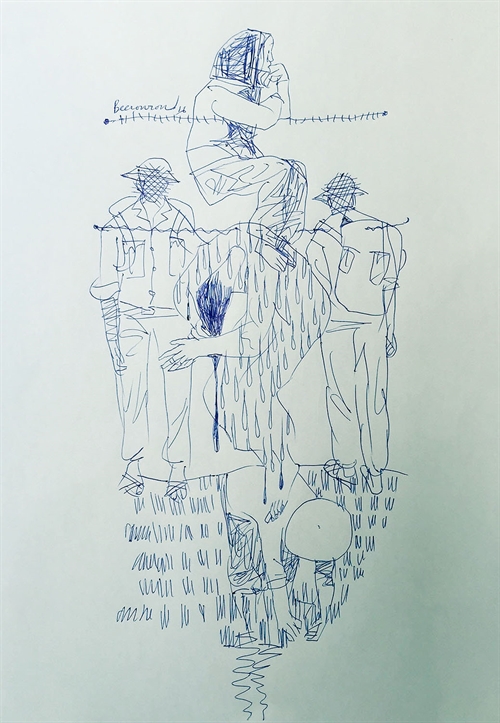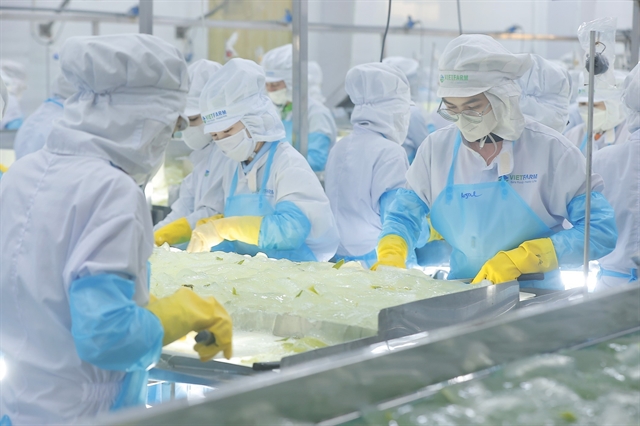

A short story by Thương Bảo
 |
by Thương Bảo
I did not know why my mother, among my maternal Grannie’s daughters-in-law, was the most hated. To an 8-year-old boy like me, family conflicts were beyond my awareness. The old woman was always nagging at my poor mother, my father only objected to her slightly, “Enough already, Mum!”
Every day my mother carried rice seedlings inside two bamboo baskets hanging on her shoulder pole to the fields, tears in her eyes. She tried to hide her sadness behind her palm leaf hat.
When lunch was over, my mother would do the washing up beside the brick well in the garden. While she worked, Grannie sat in the verandah, chewing betel-nut and fanning herself, all the while berating my mother. Only when the clangs of the cutlery by the well came to an end, followed by my father’s slight protest, would she stop.
When my mother gave birth to me, Grannie began staying at my uncle’s place. When she came to our house one day and found my mother lying alone in bed, she shouted loudly:
“Where’s Hùng, your husband? Why hasn’t he sent the ducks to the pond to eat?” asked Grannie.
“He was out since early this morning, so he left them alone. Let them be,” replied my mother.
* * *
Alongside her grudge with my mother, Grannie also hated us, her grandchildren. When my elder brother was born prematurely, he cried and cried all day long, my aunt told me when Grannie had passed away. Grannie ignored the child entirely.
At one point, my father went away to work to pay for his younger brother’s kidney dialysis. Mum stayed home alone to look after my weak brother. One morning, when my mother was at the hospital, Grannie sprayed a pinch of dust on the baby to make his umbilical cord dry as soon as possible, according to local customs. A few days later, he contracted tetanus and died in agony. After his death, my mother could barely sleep for a month. She wept and wept.
“You let your baby die young,” Grannie reproached her mercilessly.
Poor Mum! When I grew up, I often saw her eyes filled with tears! She looked like a silhouette. She was busy all the year round: sowing cabbage seeds in winter, spreading manure on the fields in summer, ploughing soil in autumn and preparing the fifth crop in spring. Meanwhile, my father enjoyed festive days with his friends, far and near, during the first lunar month.
That was his hobby after he had returned home from the war. It seemed to me that he wanted to compensate for arduous days spent on battlefields.
“As a young man, such an attitude is understandable,” remarked Grannie. “Whereas, your conditions are totally different,” she went on. All Mum could do was sob and sob in her bedroom, while Dad indulged in cock fighting, flying birds or watching goldfish swimming in a large glass bowl, which he regarded as refined pleasures.
One day my mother’s sister came to visit her. She found her crying. She tried to comfort her, while outside Grannie cursed her. I had never seen her weep so much or Grannie curse her so uncontrollably. My father was silent like a stone, swallowing his sorrow and bitterness.
* * *
Not until late in the evening, when Uncle Hoà’s funeral procession started to leave for the cemetery amid the cries of his relatives and the music of the rural band resounded loudly, would my father stamp his foot before joining the crowd.
When he returned home, he entered the bedroom where my mother was sobbing her heart out.
“You’d pay your respects, to save my face,” he told her. My mother finally stopped weeping. She lay motionlessly in bed.
A few days later, she had still not gone, despite my father’s advice to pay homage to his former comrade-in-arms. She only got up to have dinner when Grannie and my father made for Uncle Hoà’s house. At the house, he burnt a few joss-sticks and planted them in the middle of the incense burner. He said his prayers quietly. Tears trickled down his sunken cheeks.
After returning home, Grannie lay down in her room, breathing a sigh, while my father lay on the bamboo plank bed in the veranda. Throughout that night, my mother was wide awake. She did not cry.
From then on, Grannie cursed her less and less, meanwhile, my mother became more silent.
One evening, my mother asked Grannie to go out to get more feed for the piglets. Out of curiosity, I followed her. She took a short cut across the beds of newly-grown cassava to the burial ground where Uncle Hoà’s grave lay. To my surprise she threw herself on the small mound of earth.
“Why is she mourning him so much?” I whispered to myself. I knew my father was aware of her actions as he saw her pass by him in the dimly lit room facing the riverside.
“Your mother led a miserable life, terribly miserable until her death,” my mother’s sister told me one afternoon. “The only person who took pity on her was your father,” she added, hugging me tightly and sobbing her heart out on the 49th anniversary of my mother’s death.
* * *
Later I learned that Mum and Hoà fell in love with each other in their early adulthood. Those sweet memories stayed fresh in their hearts for years.
When Hoà prepared to ask my mother’s hand in marriage, he was enlisted. With a light haversack on back, he left her with a piece of advice, “The war is raging horribly beyond our imagination. I might not come back. So, don’t wait for me any longer, darling. You’d better look for another young man who loves you instead.” She wept and wept. She promised to wait for him to return for their glorious wedding. Whenever she heard of any youths who died in battle she hurried home to see if the name on the death certificate was Nguyễn Hợp Hoà. However, one day when rumours spread that Hoà had been killed, she tossed and turned at the local people’s council building and cried her heart out for hours until she was dragged home by her relatives.
Later, she was often seen wandering around the village pond or the well where she and her lover used to sit on moon-lit nights.
* * *
One year later, my father urged Grannie to come to Hằng’s place to ask her parents for their daughter’s hand in marriage.
Grannie’s proposal was warmly welcome on the grounds that Hoà and my father had been school chums. Both were classmates who, with a straw hat on their head and a paraffin lamp in hand, went to the local evening school during the anti-US resistance.
Only 25 days after the wedding her groom was drafted into the army like Uncle Hoa. Grannie told my mother to kill the one hen they had to give a farewell party to her beloved son. My father did not eat any meat. He let Grannie and Mum eat it all. The next morning he said goodbye to everybody. He only told my mother a few words, like Uncle Hoà had said, “If I don’t come back home soon, don’t wait for me for a long time, darling.”
She sobbed and sobbed for days on end. However, she did not hurry to the local authorities whenever she heard a young man dying.
Not until one day when she was busy planting rice seedlings in a faraway field, did Hành, her younger brother-in-law, come to her place.
“Dear sister, return home immediately to get the death certificate of your husband Hùng,” said Hành. At once, she collapsed in the fields.
After that, nobody ever found her crying lamentably as she had been after Hoà’s death. One week later, she ploughed the fields silently. To her amazement, Uncle Hoà returned home with an amputated arm. He was seen taking a short cut across the ricefields. He was warmly welcome by villagers. Mum only looked up, wiped away the sweat on her forehead and continued to plant the seedlings until late in the evening.
Grannie sat silently beside the areca tree, chewing betel-nuts in front of the hedge full of bright red flowers. She did not utter a word; neither did Mum. Until one day, Mum submitted to Grannie. She knelt down, hands clasped tightly together in front of my old grandmother. She prostrated herself and sobbed and sobbed. After that Mum walked to the altar, bowing to the picture of my father. A few minutes later, Mum took her belongings to Uncle Hoà’s place.
Surprisingly, his house was empty. She boiled a cauldron of medicinal herbs so that he might inhale hot steam to relieve his sunstroke and cooked porridge for him.
Returning home, she asked Grannie for a few baskets of rice to cook for him with vegetables and fish from his own pond. She was nine months pregnant at this time. Partly due to her weakness and partly to a lack of sleep and food she miscarried.
Strangely enough, Dad also returned home from the fontline with a broken knee-cap and with a bullet deep inside his shoulder blade.
Mum returned to Dad after kneeling to Uncle Hoà, who some days later also went to Dad’s place to ask Grannie and his old chum for mercy. Dad said nothing. He just sat smoking. Grannie time and again walked in and out. Mum wept silently in her bedroom.
In the following days, Dad told Mum to bring Uncle Hoà food. At first he refused, but before long received the food with thanks. Dad was becoming more and more taciturn. Sometimes, he only smoked and drank, sleeping less and less.
As I grew up and reached the age of adulthood, Grannie, then Mum, then Uncle Hoà, all passed away one after another.
One afternoon, Dad embraced me tightly. “I’ve made great mistakes with two people: your mother and Uncle Hoà. Anyhow, she’s in Hell with him now,” he said.
* * *
As I lived away from home, every time I returned I always burnt a few joss-sticks and planted them in front of her tombstone. With a bundle of incense in hand, my father gave me half of it. “You’d better divide it into halves then plant them into their incense-burners to pray for our blessings,” he told me, eyes in tears. “Grannie, don’t be upset with this action of mine. You might not be pleased about this and still angry with me. However, my heart is at ease when I perform this ritual.”
It seemed to me that Grannie smiled. I still remembered clearer the photo of her taken beside flowers when I had been a little child and Grannie was sitting on a bench, hands resting on her thighs.
“She has the same unpleasant countenance as in the photo,” said my mother’s sister.
Yet, now, I found her smiling a very satisfied smile. Her broad smile seemed to be mingled with the thin smoke going up spirally on her face, into Dad’s eyes and in the innocent looks of mine.
Translated by Văn Minh




